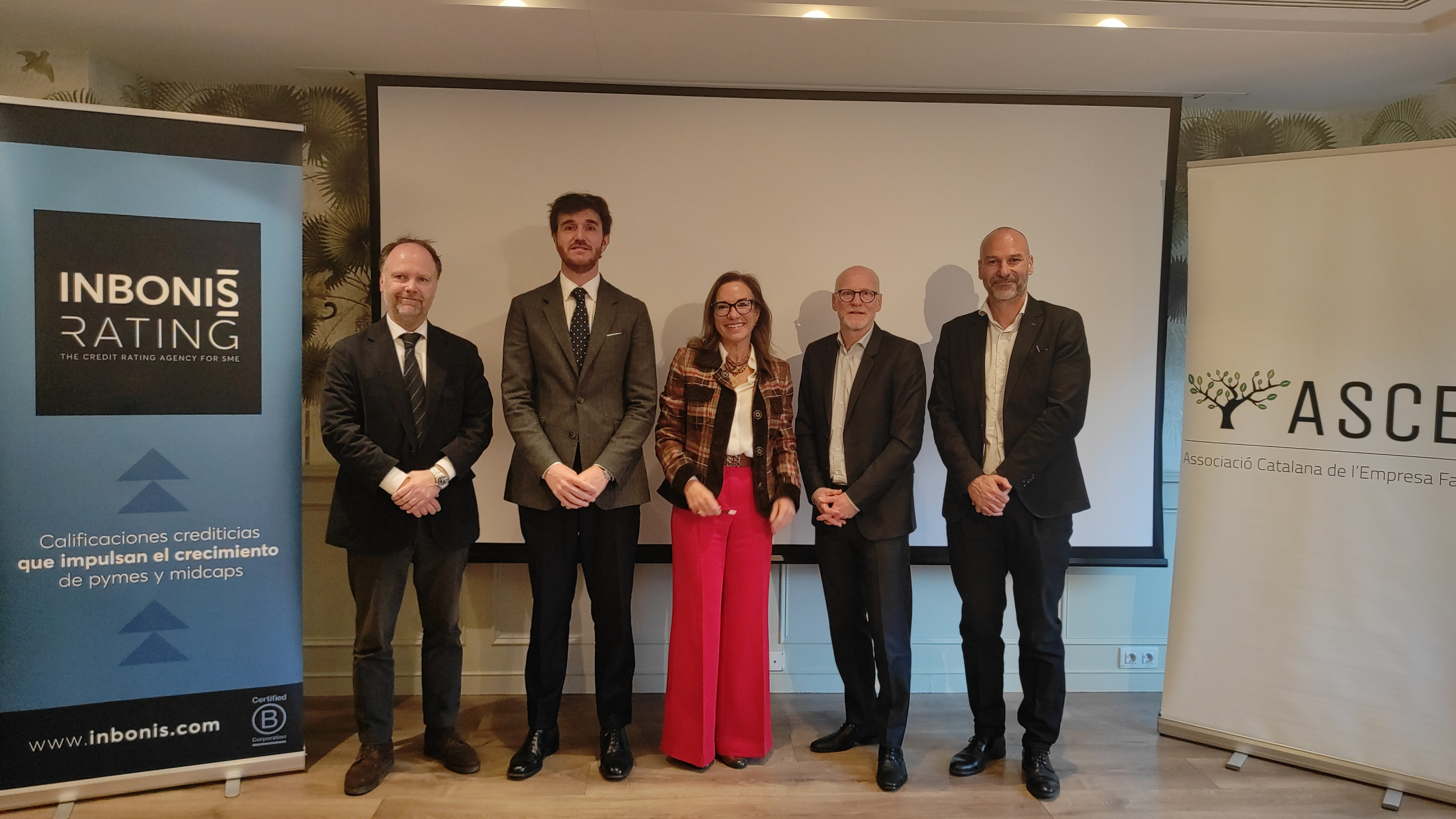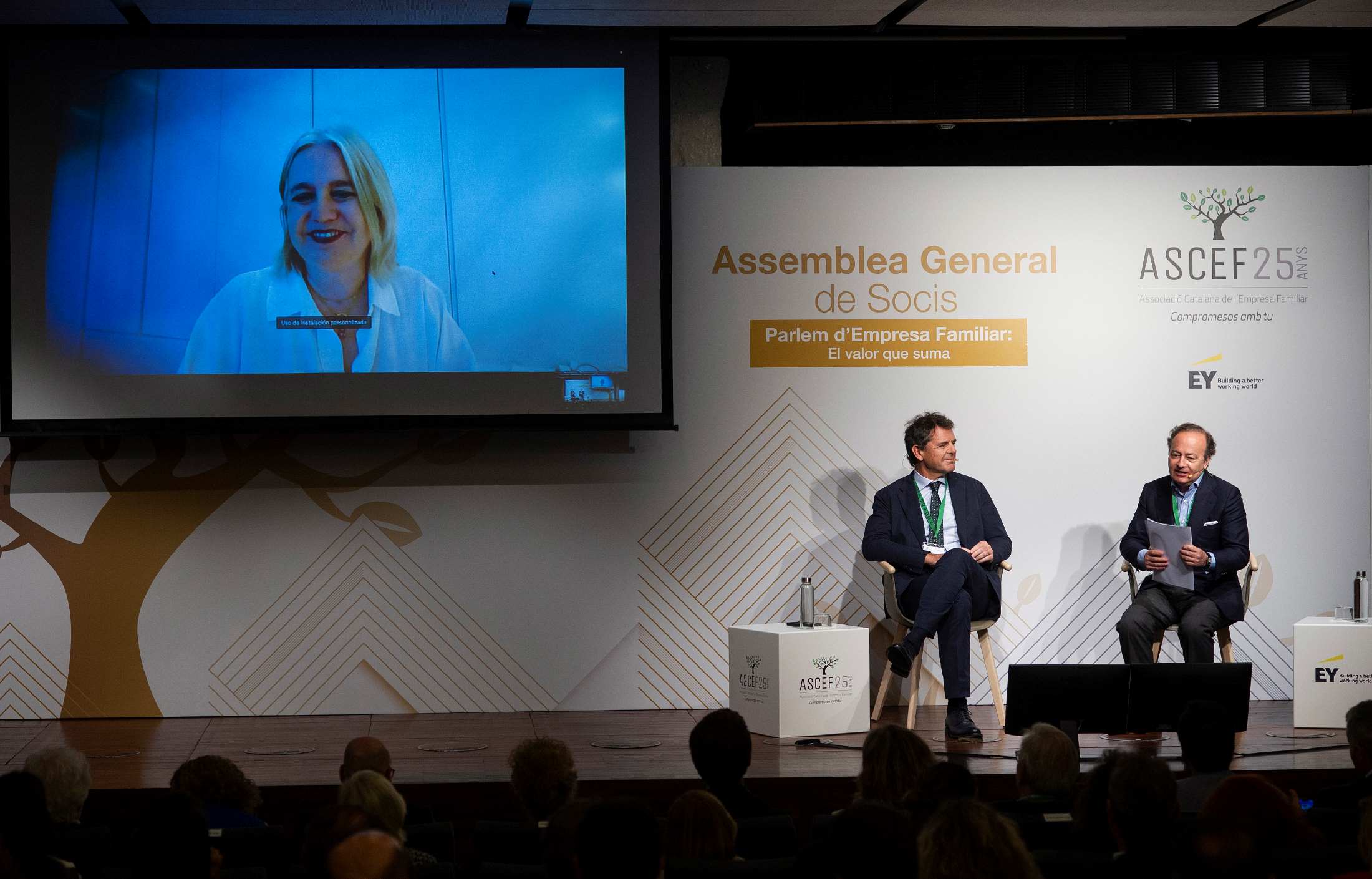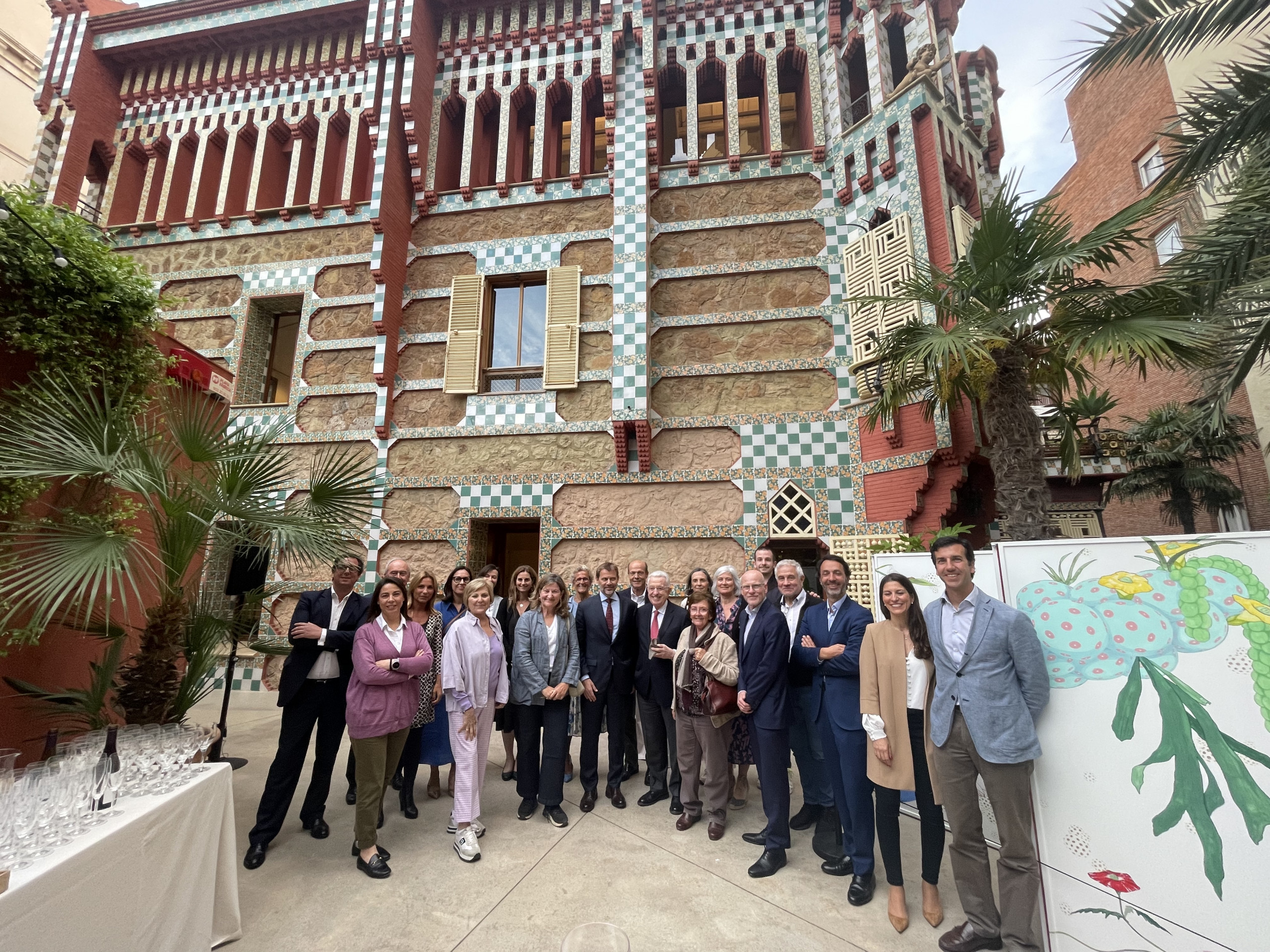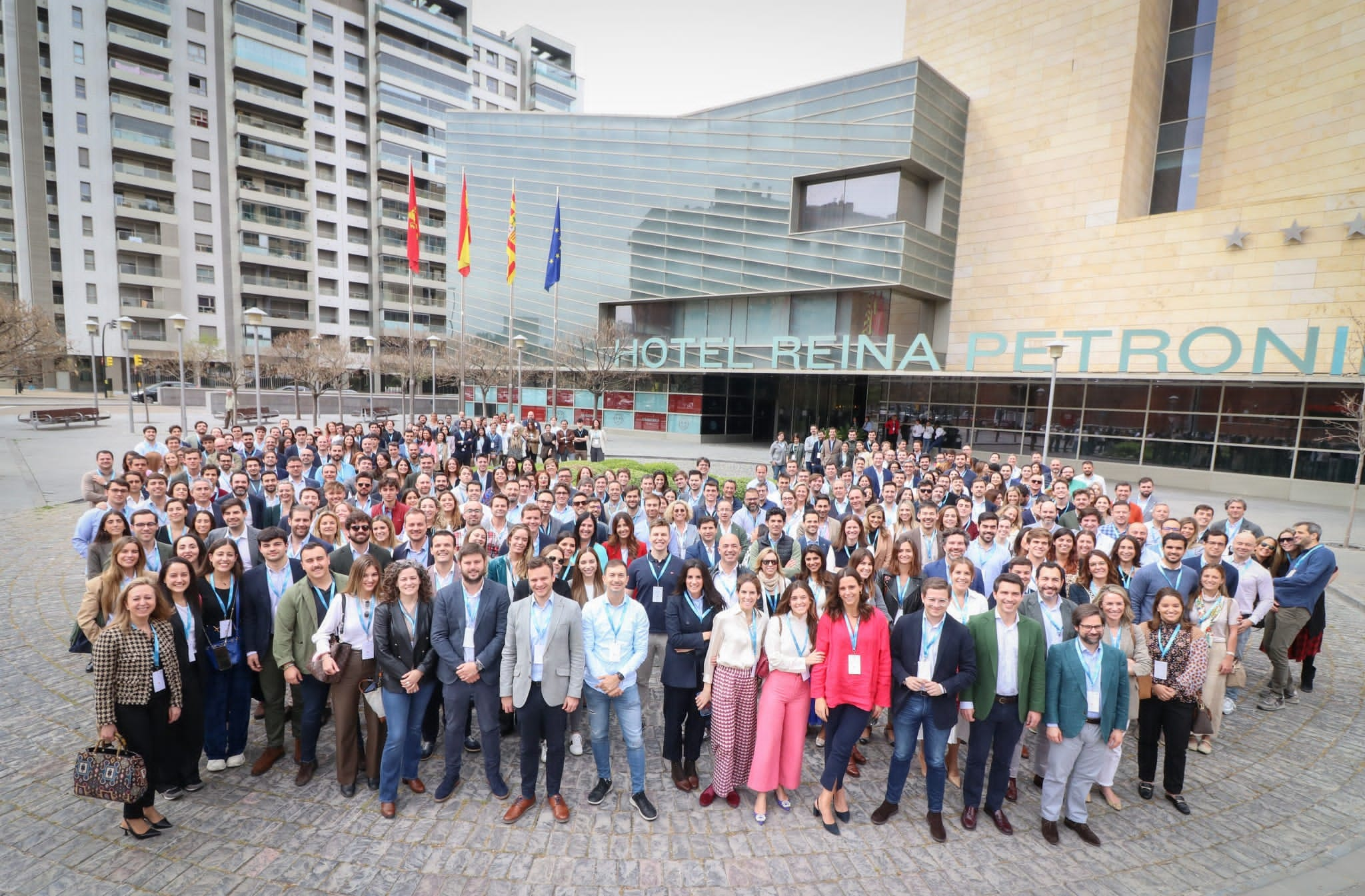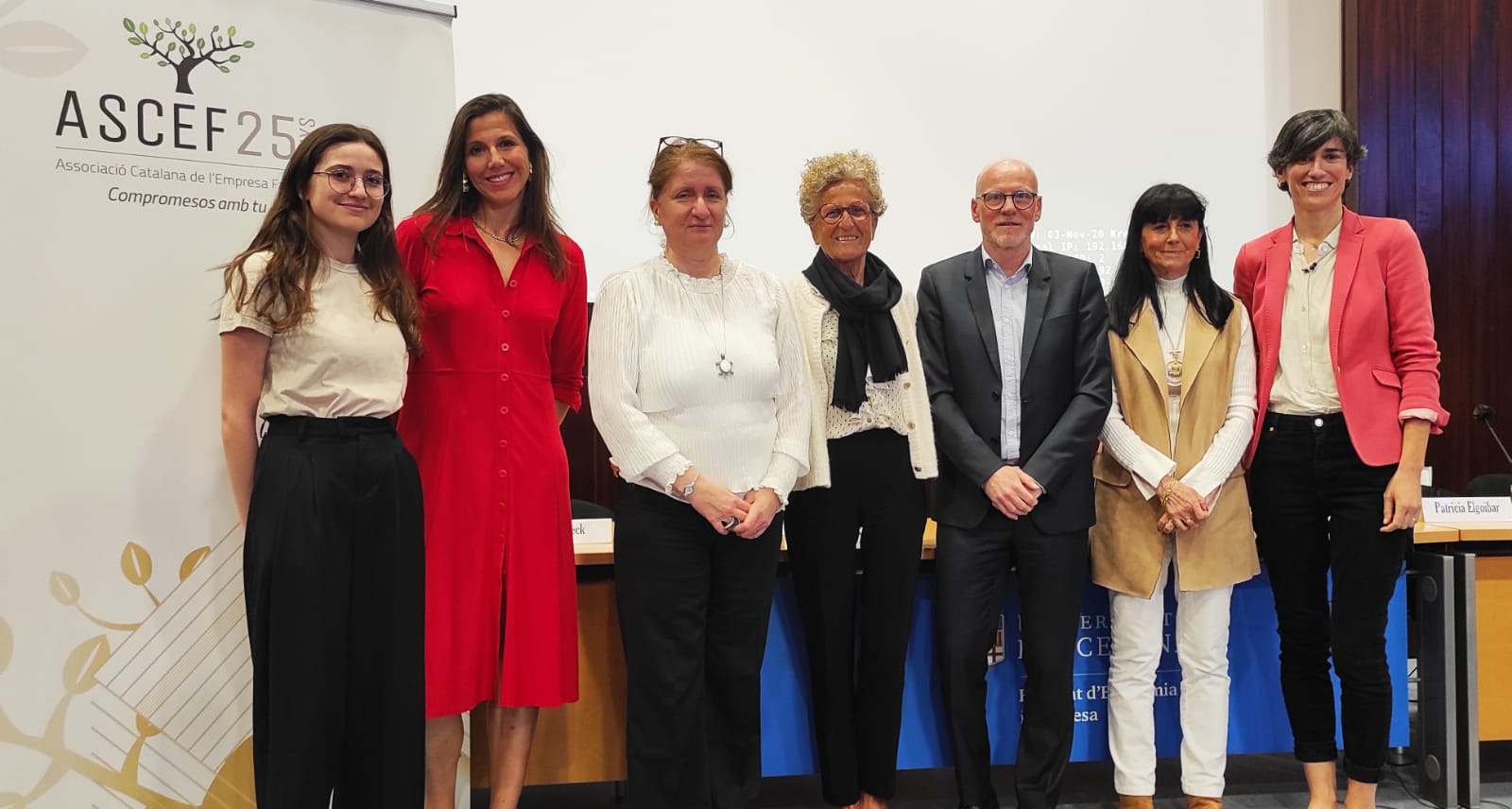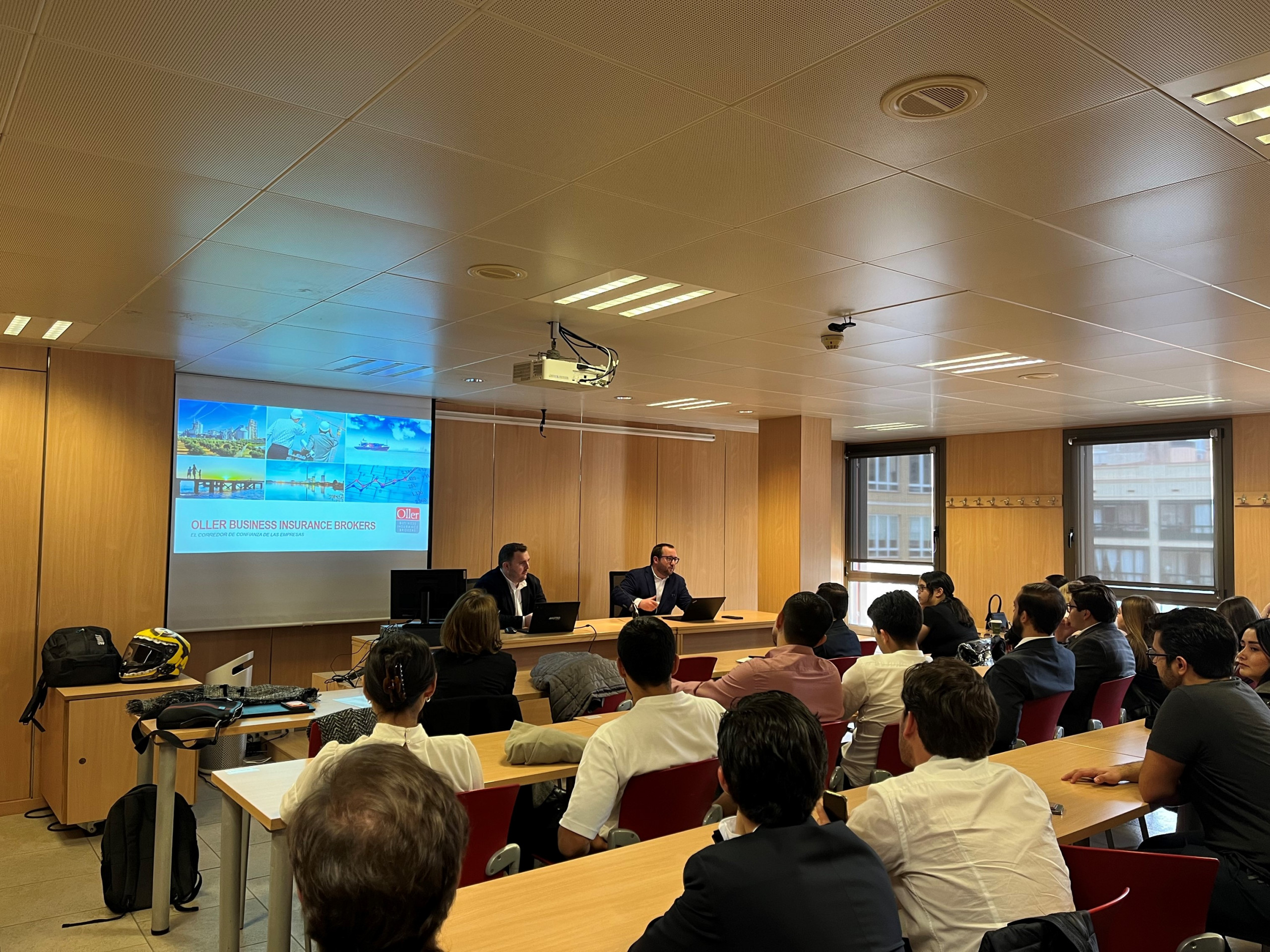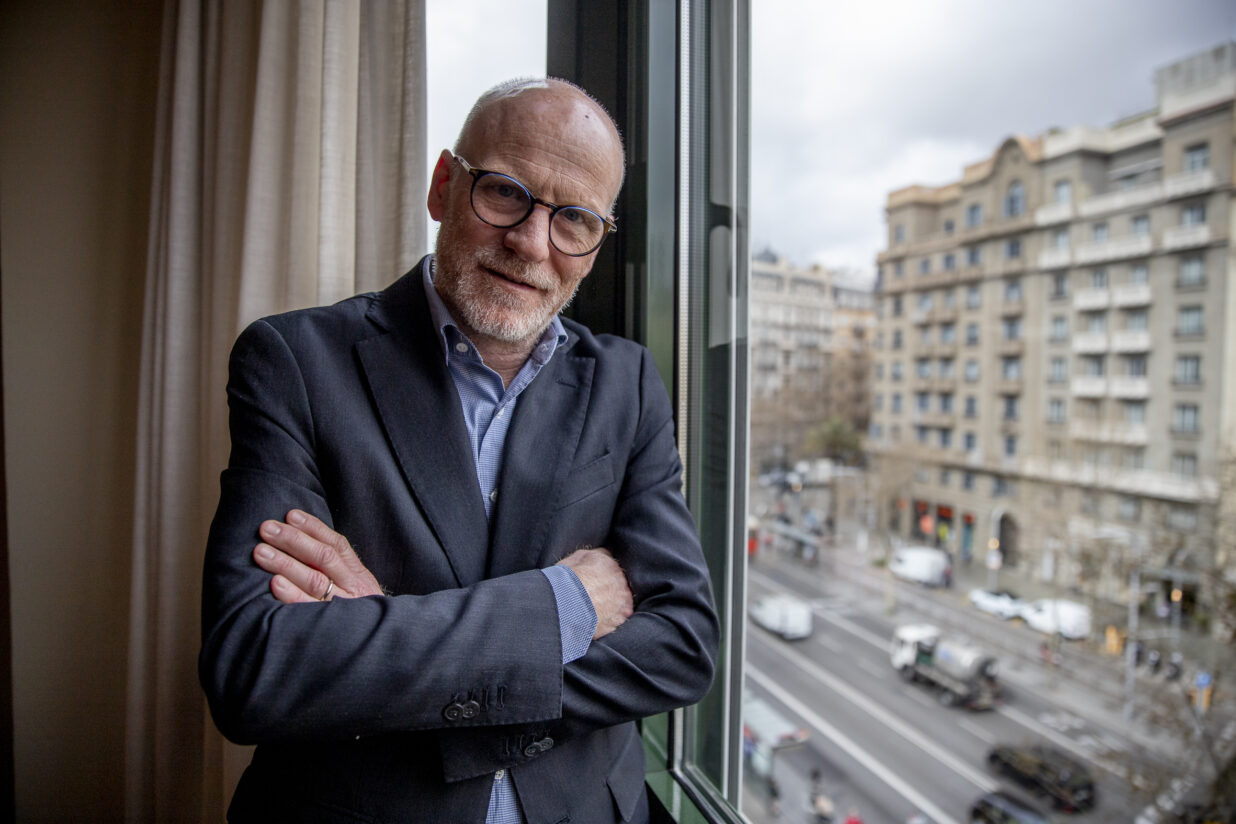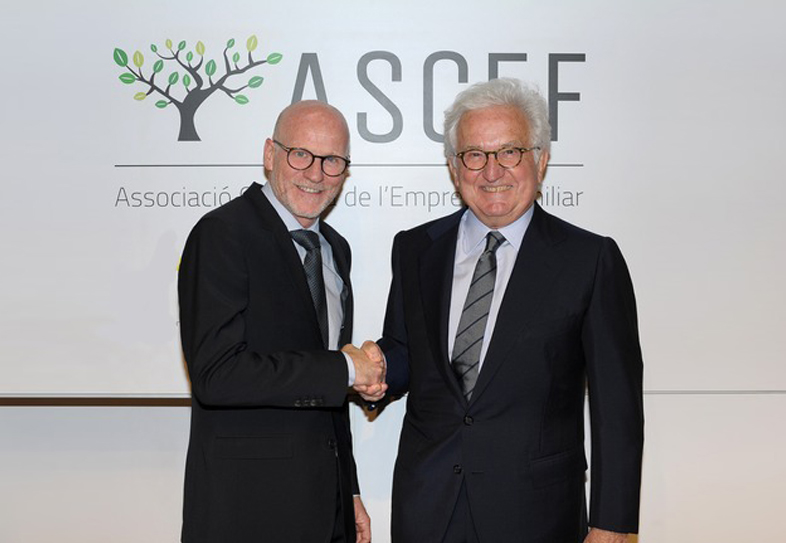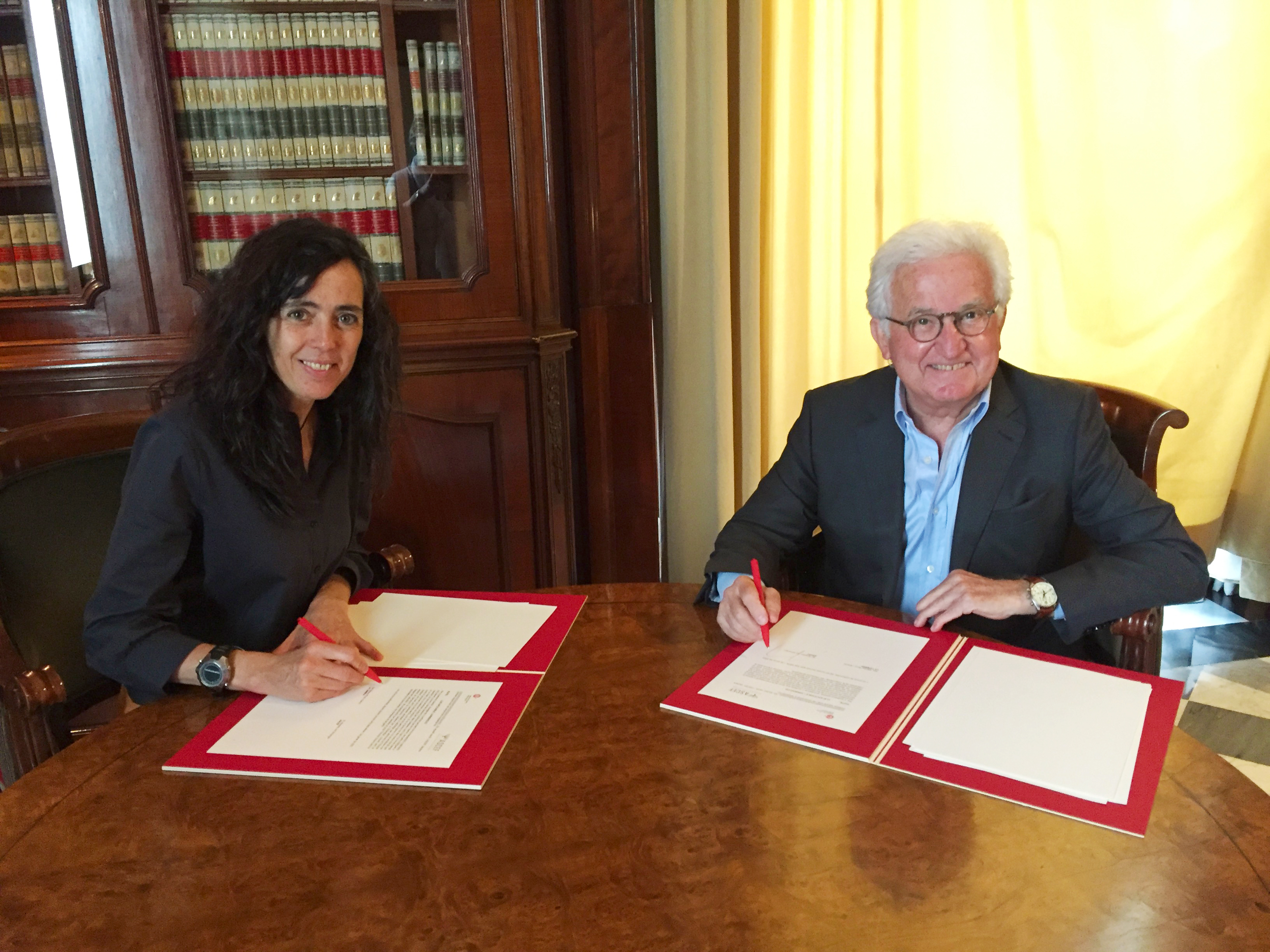ASCEF organised a lunch-colloquium with Josep Salvatella, founder and president of Rock Salvatella, where had the pleasure to enjoy of a conference that moved us at a new era where the digital transformation and the app of the IA, will be able to be applied at an immediate future at the new business.
Category: Uncategorized
Introducing INBONIS Watch for Family Business Family companies get better credit ratings than other companies
On Tuesday, February 27th, The Catalonian Association of Family Business (ASCEF, acronym in Spanish), presented the family business’ INBONIS Watch, developed by Inbonis Rating, with the support of the Family Business Institute.
Alberto Sánchez Navalpotro, Inbonis Rating’s CEO and Esteban Sastre, IEF’s Business and Economics Director, have presented the Watch’s report. One of the novelties of this credit rating agency is that beyond quantitative data reports of accounts, it incorporates qualitative criteria related to governance and, especially, integrates ESG aspects in the criteria of company development.
After analyzing more than 550 reports of credit rating for small and medium-sized companies, the first conclusion by the INBONIS Watch is that family businesses have higher ratings (over 77% of them are above “B”) than other companies. The reasons are found in the family business’ intrinsic values, namely their will for succession, experienced stockholders, and strongly committed teams.
Furthermore, we can notice a correlation between the enforcement of ESG criteria and credit rating; family companies with better credit rating manage their ESG better, consequently only family companies with good ESG management achieve the BB credit rating.
People in charge of the Watch have explained that the incorporation of qualitative aspects in risks analysis reduces the likelihood of defaults in more than 30 points, therefore the company’s status would be substantially better than what is solely conveyed through their financial statements. Also, family businesses tend to be more resilient as they overcome crisis more successfully and adapt better to and resist income loss.
Meanwhile, the Watch has pointed out financial management as an aspect to be improved by the family business, specifying that there is opportunity for improvement in the diversification of its financing sources or in balancing their settlement and collection policies, for example. This is why the second part of the session was focused on analyzing which may be the potential financing sources for today’s companies other than banks.
The round table moderated by Jaume Alsina, President of ASCEF, featured the participation of Alberto Sánchez Navalpotro, Alicia Martín, LB Oprent’s Sales Director and Quim Pagespetit, CFO of Casa Mas. Alberto Sánchez noted that we find ourselves before a paradigm change where banks are more reluctant to offer long-term credits, and companies should seize the opportunities provided by alternative financing sources; so it was particularly interesting to hear the testimony of the other two guests who have shared their experience in the search for and handling of private and public long-term financing.
ASCEF Holds its General Partners Meeting: “Let’s Talk about the Family Business, a Value that Grows
On June 15th, ASCEF held its annual general partners meeting, one of the most expected events of our association agenda. As usual, the encounter offered a space for reflection and entertainment, as well as institutional discussion. We appreciate EY’s collaboration and support.
The event was held at such a privileged and special venue as La Pedrera, and we took the opportunity to start with a private tour through this building so spectacular and magical.
Later, we held the General Partners Meeting, where, among other matters, the ASCEF’s Ethical Code and the succession for the Young Forum were approved . Ariadna Sendra an Albert Borràs are taking over for Ricard Oller as the Forum’s co-chairmen. We’d also like to take this opportunity to thank Ricard Oller for his great work and dedication as chairman.
After the meeting was over, the open session of the event started with Jaume Alsina’s, ASCEF President, intervention, who welcomed all the attendees and presented the association’s corporate video, which intends to convey the reason to exist of family companies using two “magic” words, commitment and legacy. In his address, Jaume Alsina reviewed the current situation of uncertainty, which calls for a redefinition of the “global market” concept, and how in this new scenario, the family companies should constitute a leverage of progress and positive influence: “As entrepreneur families, we want to responsibly contribute to a better world. This is why we should keep dreaming, overcoming challenges, with the firm will to advance in the creation of a more egalitarian and equitable society.
Next, Joan Tubau, responsible partner from EY Cataluña’s Assurance, had some words for the attendees highlighting the strong tradition of the Catalonian family business, being an important entrepreneurship driver, and shared the idea that a company is a lot more than just a business, it is also a legacy for the future.
Discussion panel “Companies with history: Past, present and future”
The word and concept of “legacy”, very present in all encounters, was also the focus of the discussion “Companies with History: Past, Present and Future”, with the participation of Rosa Tous, Tous’s Vicepresident, Joaquim Uriach, Grupo J. Uriach’s CEO, and President of the Family Counsel, which was excellently moderated by José Luis Blanco, Chief Executive Director of the Family Business Institute.
Following the script line marked by the title of the discussion, both speakers went over the origin of their companies. Grupo J. Uriach, which is going through its fifth generation, was founded in 1838 when a rebel left the family mill to work for a drugstore in Born, Barcelona. Over time, he bought that drugstore and 180 years later, the company was founded and continues to operate in the health industry. Rosa Tous, a third-generation member, explained that the company was born in 1930 when his grandfather started a small clockwork shop in Manresa, and her grandmother started selling chains and jewelry. The following generation took that big leap from workshop to the company we all know today.
In this line, José Luis Blanco reminded that family companies are not created as multinational corporations but instead step by step, growing and going through transformations. “Continuity is evolution, we must always redefine what we do”, he said. Joaquim Uriach explained that the key for Grupo Uriach’s evolution has been that each generation has contributed with a vision different than the previous one, a new idea, an innovation that the other generations respect: “The companies that survive are those with a dynamic mindset, which lend their lines of business as we have done, always within the health industry”, he explained. Rosa Tous also explained that it was her parents, while travelling and going to fairs, who sensed a change in taste of the women who approached their workshop-kiosk and realized that if they were unable to offer what the female customers sought, they would have to design and manufacture it themselves. This was how the little bear was born and how the journey of a traditional and conventional jeweler started to eventually become the international company Tous is nowadays.
The round table discussion also stressed the importance of the family business internal evolution and that of their governing bodies. They underlined the role of the boards of advisors which bring the knowledge and professionalism of external advisors to the company or, in Tous’ case, even the incorporation of external partners.
To wrap up the discussion with a vision of the future, the speakers concurred in the disposition of their respective companies to keep growing with an eye on the market and the customer, “with vision and ambition”, as expressed by Joaquim Uriach.
ASCEF’s President, Jaume Alsina, concluded the event thanking all the participants for their assistance and reminding that, despite all, the best is yet to come.
MoraWealth opens the doors of Casa Vicens for the Catalonian Family Business Association (ASCEF)
Barcelona, May 5th, 2023.- Last Thursday, MoraWealth, Grupo MoraBanc’s brokerage firm in Barcelona, invited the Catalonian Family Business Association to hold a joint event at Casa Vicens, Antoni Gaudí’s first major project.
This encounter comes as part of the 25th anniversary celebration of the Catolonian family entrepreneurs’ organization, whose members, headed by its President, Jaume Alsina, had the opportunity to enjoy a visit to the interiors of this modernist building located on Carolines Street and owned by Grupo MoraBanc since 2014.
After a tour, which showed the value of Gaudí’s architectonic expertise manifested in the building, constructed between 1882 and 1885 and declared as UNESCO World Heritage in 2005, the CEO for Grupo MoraBanc, and a fourth-generation member of the Mora family, Lluís Alsina, delivered a lectured called “MoraBanc: keys to family management at a reference group”.
The organization’s CEO highlighted the important bond of MoraBanc with the city of Barcelona, not only for being a natural venue or for its proximity to Andorra, but also for the presence of the Group through its brokerage firm, MoraWealth, founded in 2020. A cultural relationship with Ciudad Condal (Barcelona) had been established previously with the acquisition of Casa Vicens by MoraBanc, which took on an ambitious and thorough restoration project to transform it into a museum.
Renown personalities of the business world attended the event that concluded with champagne and appetizers. The outcome of the visit to the property was positive and showed MoraBanc i MoraWealth’s commitment to the Catalonian businessmen and its will to safeguard the historic and cultural heritage of the city of Barcelona.
About MoraWealth
We are a brokerage firm headquartered in Barcelona as a branch of the Andorran banking group, MoraBanc. Thanks to a professional, qualified, and expert team, we are able to offer financial counseling services, and individualized and discretionary portfolio management with an adjusted customized strategy based on our clients’ needs. A valuable and differentiated offer that leverages on synergies with Grupo MoraBanc, an entity with over 65 years of experience in private banking.
About ASCEF
The Catalonian Family Business Association (ASCEF, acronym in Spanish) is an organization founded in 1998 by a group of companies representing the Catalonian business structure. Its constituent entities play an important role in the country’s economy for its commitment to wealth and employment creation, territoriality, and sustainability.
The family business forum discusses values, succession and future in Zaragoza
Values, succession, and future are the three axes on which pivoted the 19th National Meeting of the Family Forum, which gathered, in Zaragoza, 350 young members of entrepreneur families from all over Spain; an event organized by the Family Business Institute and the Aragón Family Business Association, with the collaboration of Deloitte and Banco Santander.
The motto chosen for this year, “The Spain Beat”, seeks to convey the idea that, aside from the debates we are attending to, the country is moving and advancing thanks to the contribution of the civil society and the family companies, which day after day open their doors with the hope of doing something for their communities.
The Family Forum is the venue for future generations of stockholders, board members and executives of the companies that make up the Family Business Institute (IEF, acronym in Spanish) and affiliated Regional Associations (AATT, acronym is Spanish). It is the space created for the youngest family members who represent their companies’ generational continuity, a forum for discussion and exchange of experiences and concerns.
On Friday afternoon, the meeting’s attendees visited facilities of outstanding Aragonese companies like La Zaragozana, Pikolin, Fersa, IQE, and Cefa.
The academic session, chaied by the Aragonese journalist, Ana Aínsa, took off on Saturday with a welcoming speech by the IEF’s CEO, José Luis Blanco, who reminded the audience that what really makes a company a family business is the commitment of the next generation, and pointed out that in these so special times we are living in, reality must be built with facts and commitments, just like the family business do each day.
Staying away from the noise generated by uncertainty
Jorge Blanchard, President of the Aragón Family Business Association, encouraged the meeting attendees to “stay away from the noise generated by uncertainty”, be prepared to address the challenges the future may hold, cherish human capital, and always maintain the innovation spirit that characterizes the family businesses.
Asier González, Managing Director of Santander España, reminded that his bank was founded 176 years ago, as an entity intended for supporting companies, and that ever since, its mission has been to contribute to the progress of these companies, communities, and society.
Lastly, David Álvarez, Active Partner of Deloitte in Aragón, listed five transforming challenges that, in his opinion, all companies, whether family business or not, must address: namely, sustainability, digitalization, data input, talent, and inorganic growth.
A psychiatric diagnosis of society
The first morning session called “Making Good Things Happen to You”, was led by Marian Rojas Estapé, Psychiatrist from the Spain Institute of Psychiatry Research, and was presented by Enrique Sendagorta, a member of the family company, Sener. Rojas made a complete psychiatric diagnosis of the current society, bringing into focus how people are intoxicated by two major hormones like cortisol (stress) and dopamine, (pleasure, addiction), and mentioned the existence of a profound crisis of attention.
Grupo Pikolin set up the next round table with the title “When the Family Takes Care of Business”, featuring its President, Alfonso Solans; the Group’s Vice-President and President of Dunlopillo Holdings, Borja Solans, and his brother, Álvarez, Grupo Pikolin’s Vice-President. The table’s moderation ran on Jorge Esteban, Director of the Aragón Family Business Association.
In his speech, Alfonso Solans noted that the job of any good entrepreneur is to pave the way so that the next generations get access to the realm of management, while also stating that at eventually the most difficult decision is always “who will steer the ship”.
On the other hand, Álvaro Solans acknowledged that the surname carries a weight for the company’s new generations, and that having great role models such as his grandfather and father constitutes a challenge that, in his words, he faces with hope and responsibility. Meanwhile, Borja Solans, asserted that a long-term perspective and a personal commitment have been key in integrating the family culture into the Group’s Asian branches.
Are we ready to live within the Internet?
Later, a discussion group called “Metaverse and Extended Reality, the Future is Here” was held with the participation of Pedro Lozano, Cofounder of Imascono; Víctor Pérez, Digital Marketing & Growth Manager of ISDI, and Patricia M. Val, Cofounder and CEO of Future Space. The group was moderated by Isabel Puig, Institutional Coordination Manager of Santander España, who questioned if we were prepared to live within the Internet, where many things from the real world will be found.
In this respect, Patricia M. Val asserted that Metaverse is the new structure that will support the Internet within 10 years. “It is being built, but it still needs to be developed in many ways. What is clear is that those who come late will find rules already implemented”, she said.
In Víctor Pérez’s view, Metaverse is an opportunity. “On which side of history do you want to be?”, he wondered. “On the side of those who believe it will be a failure or on that of those who seek how to help their businesses?” Pedro Lozano, on the other hand, claimed that the future will assume a hybrid model, “where we will have the best of the physical world and the best of the virtual world”.
The first afternoon session was led by Professor Alfonso Chiner, Scientific Collaborator of the Strategic Management for IESE, who presented the audience with a case study under the motto “Succession, An Open-End Movie or Series”. During a spirited debate with the group of new generation members from the family business, Chiner wrapped up a series of key ideas: “We are family; we need to talk; communication can be fixed, trust cannot”.
The following round table entitled “ESG, All Time Values” summoned Javier Pérez de Mezquía, Saica’s Board Member; Beatriz Molins, Cementos Molins’ Board Member and FIBAC’s Couselor, and Clara Arpa, ARPA’s CEO; it was chaired by Salvador Bautista, General Secretary of Bergé y Cia.’s Board.
avier Pérez de Mezquía elaborated on the idea that served as the session’s title, “Today we called it circular economy, but we started doing it in our business back in the 70s. According to Saica, each business decision must fit into the SDGs.”
What good can we do for our society?
On her turn, Clara Arpa noted that her company is 55 years old, “and on each fiscal year, we wonder what good are we going to do for society”. Finally, Beatriz Molins emphasized the need to preserve the environment by creating value and placing sustainability at the core of each business strategy.
The last session of the academic day was called “Family Offices”, How Do Family Businesses Invest? featuring Alberto Folch-Rusiñol, Vice-President of Fábricas Folch; Albert Botet, Managing Director at Inderhabs Investments, and Armando Fandos, Wealth Manager Director of Zubi Wealth Management. This last event was moderated by Fernando Vázquez Castro, Partner of Deloitte Legal, who mentioned that, in his opinion, the family offices are an instrument, but not an end for the family business.
Despite that, for Alberto Botet, the vision, goal and managing bodies of a family office must act just as those of the family business. In a similar key, Armando Fandos stated that sustainability, profitableness, and impact should lead the way of investment for the family business. On his turn, Alberto Fosch reminded that companies do not always go well, therefore diversification is important.
Finding strength in unity
The meeting concluded with a summary of conclusions by Salvador Bautista and an address by Patricia Riberas, President of the Forum’s Executive Board, who sent a message to the members of the family business new generation. “In the current times, we need to find our strength in unity.”
Then, Esther Aguirre, President of the Family Forum for the Murcia Association, announced that the next National Meeting of the Family Forum, in its 20th edition, would be held in Cartagena, in 2024.
Talking about female leadership in the family business
On Wednesday March 29, we enjoyed and learned about female leadership in the family business thanks to an excellent round table organized by the ASCEF and the Faculty of Economics and Business of the University of Barcelona. Speakers representing the world of business such as Diana Ganduixer, president of Grupo Bonanova, from the university such as Patricia Elgoibar, professor in the Department of Business at the UB, and from the student body, such as Alicia Bosch, and with the participation of Amélia Diaz as moderator, explained to us the characteristics of female leadership, the internal and external barriers we face and how all of us, women, companies, universities, society and administrations, must keep moving forward to achieve equality and equity.
The ASCEF Forum participates in the Cuatrascasas Legal Week
Ricard Oller, president of the Forum of the Catalan Family Business Association and Albert Borrás, member of the ASCEF Forum committee, have given a session that is part of the “Cuatrecasas Legal Week” program for students from the Pan American University of Mexico. An innovative program on business law that has dedicated an important part to the challenges and opportunities of the Family Business.
VilaWeb interviews Jaume Alsina, president of ASCEF
VilaWeb has interviewed Jaume Alsina, president of ASCEF, to talk about the challenges and the current situation of family businesses and the role that ASCEF should play. You can read the entire interview at this link
Renovation of the Catalonian Family Business Association Board of Directors
Jaume Alsina succeeds Amadeu Jori at the ASCEF’s presidency
Barcelona, 17th of June 2022. – The Assembly of the Catalonian Family Business Association (ASCEF) was held last Thursday 16th of June, where Jaume Alsina, of Encofrats J. Alsina, took over the presidency succeeding Amadeu Jori, of Jori Armengol & Associats.
In his farewell address, Amadeu Jori, mentioned the challenges during the last five years which tested the resilience, entrepreneurship and courage of the Catalonian family business, first with the political tensions derived from the October 2017 events, later with the unexpected advent of the pandemic and finally the war in Ukraine, a soaring inflation, supply chain related shortages, as well as economic and social uncertainty.
He placed emphasis on the Association’s mission to further the ESG culture at the heart of the companies, and thus reminded the triple commitment, commercial, social and environmental, that was subscribed during the last Family Business Conference. We, the family enterprises, he said, are the ones who have to drive this change which will not come from governments or public administrations. A change towards a humanistic capitalism which, leaving behind the School of Chicago postulates, leads us to a more habitable, dignified and prosperous world for future generations.
He also referred the relationships that have been established with Foment del Treball, Pimec, Aijec, FemCat, Cambra de Comerç, Fira de Barcelona and other entities of the business and economic realm to join efforts and take joint actions aimed at improving the Catalonian productive fabric.
He mentioned the ongoing dialog with the Generalitat Government to which they have communicated their clear and plain stance regarding the infrastructure deficit and the need for a regulatory framework improvement to stimulate the growth of companies, as well as the convenience of a tax relief to support competitiveness with other companies from the European Union and other Spanish Communities who are playing with a head start. He also insisted that family enterprises are the driving force for the country’s economy as well as its source of prosperity and progress. He reminded that the Association is made up of 114 leading family enterprises with an aggregated turnover of 33,000 million euros.
Finally, with the Board of Director’s consensus, he proposed Jaume Alsina as the new President whose nomination was approved by the Assembly.
Jaume Alsina, have been a Secretary to ASCEF’s Board of Directors and a member of its Executive Committee since 2017. He is a Bachelor in Economic and Business Science from the Pompeu Fabra University, completed a post-bachelor’s in leadership at ESADE and holds a Senior Business Management Degree from IESE. He is currently the CEO of Encofrats J. Alsina.
ASCEF and Barcelona’s Chamber of Commerce get together to drive the family business activity and competitiveness
This agreement values the weight of the family business in the territory’s productive fabric and its main objective is to propel actions and services to further the growth of this sector.
Barcelona, June 14th, 2022.- The Catalonian Association of Family Business (ASCEF, acronym in Spanish) and Barcelona’s Chamber of Commerce held an event last Tuesday to formalize a collaboration agreement aimed at divulging the family business’ role launching it into the Catalonian economic world. In this way, the agreement will promote the development and implementation of projects to further the growth of the productive fabric and will also promote the services developed by the Barcelona’s Chamber for the business sector.
The agreement was subscribed by the President of Barcelona’s Chamber of Commerce, Mònica Roca i Aparici, and ASCEF’s President, Amadeu Jori, whereby they undertake to define initiatives and lines of actions to motivate synergies between both organizations, and to offer mutual support to share the resources and common spaces that could propel the activity and competitiveness of the business family.
The event was also attended by ASCEF’s director, Isabel del Sol, and the Director of Competitive and Institutional Relationships of the Barcelona’s Chamber of Commerce, Xavier Ricart.
In this way, the Barcelona’s Chamber of Commerce provides ASCEF different services, tools, and spaces to develop their communication and promotional operations like its involvement in European projects, education on business, access to the Woman, Business, Enterprise Watch (ODEE, acronym in Spanish), among others. On the other hand, ASCEF is committed to collaborate with the creation of action content in order to drive the activity and competitiveness of the family business, as well as with the promotion of the actions that would be developed in the agreement.
The Barcelona’s Chamber of Commerce is driving a new economic model:
The Barcelona’s Chamber of Commerce offers transverse services to enterprises contributing to the economic and business development of the whole productive fabric. As a route map, the corporation adopts Project Cataluña 2030/40 with the goal of building a new economic model which help outline a Catalonia that would be more internationally involved, socially responsible, environmentally sustainable and with high added value.
ASCEF, an organization serving the family business:
The Catalonian Association of Family Business (ASCEF), is an organization constituted in 1998 supported by the Family Business Institute (IEF, acronym in Spanish) and made up of over 100 representative enterprises of the Catalonian business grid. The entities that form it have an outstanding role in the country’s economy and are companies dedicated to the creation of wealth, employment, territory and sustainability.

